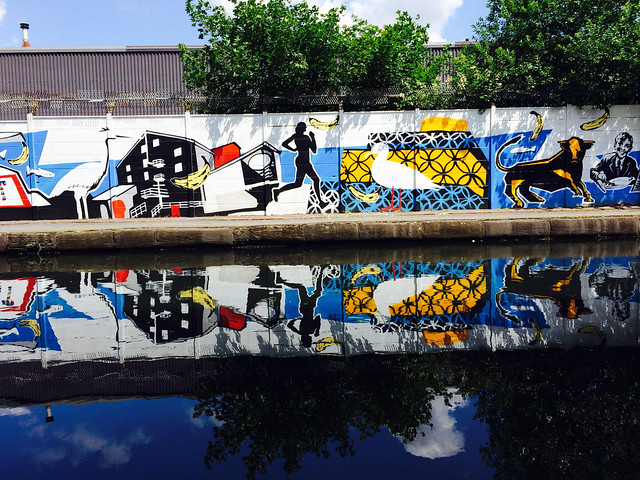One of the most divisive subjects amongst runners at the minute is how we get water during a race. Broadly speaking, there are a few different ways you might get water during one:
- bottles,
- cups,
- pouches,
- self-service (e.g. for use with reusable collapsible cup),
- water bladder such as a Camelbak.
In anything over a marathon I believe the best options are the latter two — just because of the logistics of how many water stations would be needed, how much more waste there’d be, and because it’s good to be self-sufficient during an ultra marathon.
For other races, the most popular option tends to be water bottles. They’re easy to use, you’re unlikely to spill water, and as long as the area is well laid out (and you’re sensible) you can dispose of it easily and safely. The major drawback though is that safe disposal is often not the case — the later in the race you reach one of these the more that will tend to be strewn across the floor. They create a trip hazard that can cause serious injury. They’re also not as easy to recycle as they need emptying first — so manual labour is required before this happens. Greenpeace suggests we only recycle 30% of plastics in this country due to issues like this. This much waste is not acceptable in modern society when ocean pollution and petrochemical seepage in landfills are killing.
Pouches tend to be very similar to water bottles, and there are no advantages I can think of for these over water bottles. If anyone can think of one, I’d gladly hear it, but for me one of the major drawbacks of a pouch over a bottle is that they can be very hard to get water out of. In fact, one race that uses these publish instructions online on how to use them — and people still struggle. On hot days this is not safe when people are expecting to be able to use the water provided on the course.
Cups have the advantage of being safer when discarded as they’ll crunch under foot and won’t remain filled with water. However, this benefit can be it’s drawback as well — many people do struggle to drink water from cups as they’ll lose the water as they take the cup. There are techniques however that can minimise this so you can drink as much water from a cup as you would from a bottle. They also have the advantage of producing less waste.
Then there is the self-service option — this can be good for ultra marathons where you’re expecting to stop, but for shorter races a concern is that by stopping entirely your legs could cramp up. It’d also have the potential to create queues in mass participation events. If you’re racing for a time, then you’ve either got to factor that into your pacing, or just not take on water. On a hot day that’s not realistic. It would make “Good for Age” and championship times that little bit harder to achieve.
This brings me on to water bladders. They’re a nice solution but they do raise a question. How do they affect times? Runners World have published research in the past that indicated elite athletes do benefit from lighter trainers. In that instance it’s minuscule, but it follows that for athletes in general carrying the weight of water on your back would slow you down — you’ll tire sooner.
Save the planet or save your PB. It’s a choice I suppose.
— tweeted by teef2 on Twitter
Pace is not as important as saving the planet; there’s no question there. Pace is however something many people do strive to improve. Getting faster can make it easier to get into some races. Is it possible to save both? So far from what I’ve said above, maybe it seems unlikely. I don’t believe it is though.

If we consider bottles to be the best for pace, and worst for the planet; then either a reusable cup or bladder would be the best for the planet and worst for your pace. I believe cups sit in the middle.
Cups are a single use plastic. They are recyclable, and are easier to do so than bottles as the water flows out quickly due to that big hole you drink out of. We do however need to remove our dependency on petrochemicals. They’re an ever decreasing resource, and a major source of pollutants.
So where does that leave us with cups? Sure we can recycle them, but would it be better to make them from hemp plastic or paper? Okay, so the technology isn’t quite there to mass produce cups from hemp plastic, and I’d rather not see more trees being cut down. One day though it will be viable, but what do we do in the meantime?
In my mind the solution is we use plastic cups until we’re in a position to make cups from hemp plastic, and recycle every one that is used. I know many people don’t like using cups and it can put people off so what’s the solution to that?
Easy. Race organisers could ensure that all race instructions advise how best to use cups in a race. Races could also offer both cups and a way to fill your own reusable cup.
If we want this world to survive we need to reduce our waste. Every little helps, and runners can help make that change. We have to do something.